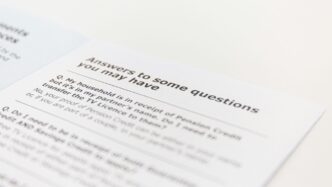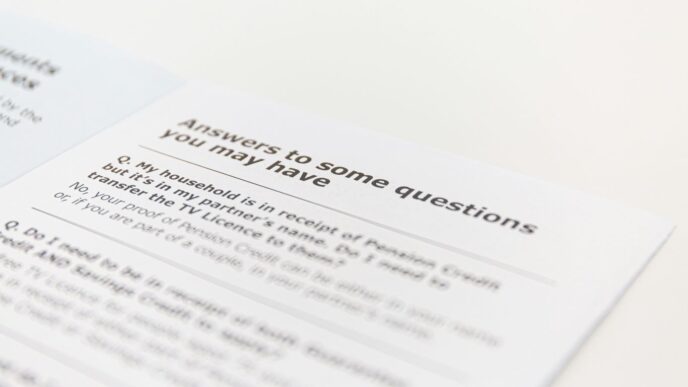Getting ready for an interview can feel like a big deal, and one of the trickiest parts is talking about your good strengths for interview success. It’s not just about listing things you’re good at, but showing how those things make you a great fit for the job. You want to make a real impression, not just say what everyone else says. This article will help you figure out how to pick and present your best qualities so you stand out.
Key Takeaways
- Understand why interviewers ask about your strengths.
- Match your strengths to what the job really needs.
- Tell stories that prove your strengths with real examples.
- Show how you’re always learning and getting better.
- Make your answers unique and memorable for the role.
Understanding Interviewer Intent
Interviewers aren’t just trying to fill a seat; they’re trying to understand if you’re the right fit. It’s like they’re assembling a puzzle, and you’re one of the pieces. They want to know how well you know yourself, how you apply your strengths, and how you’ll mesh with the team. It’s more than just skills; it’s about personality and potential.
Evaluating Self-Awareness
Interviewers want to see if you actually know what you’re good at. It’s not enough to just say you’re a hard worker. They want to see that you understand your strengths and how they translate into real-world situations. Can you articulate your skills and back them up with examples? They’re looking for genuine self-reflection, not just rehearsed answers. Think about it – if you can’t identify your strengths, how can you use them effectively? This is a key part of interview success.
Assessing Workplace Application
It’s one thing to have strengths; it’s another to use them effectively in a work environment. Interviewers are trying to gauge how you apply your skills to achieve results. Do you just possess the skills, or do you actively use them to solve problems and contribute to the team’s goals? They want to see how your strengths translate into tangible benefits for the company. It’s about demonstrating that you can take your skills and turn them into something valuable.
Gauging Team Complementarity
No one works in a vacuum. Interviewers are also trying to figure out how your strengths will complement the existing team. Are you bringing something new to the table? Do your skills fill a gap? Or do you duplicate existing skills without adding unique value? They’re looking for candidates who can enhance the team dynamic and contribute to a well-rounded skill set. It’s about finding someone who can work collaboratively and bring out the best in others. A good team is more than the sum of its parts.
Strategic Preparation for Success
Landing a job isn’t just about having the right skills; it’s about showing you have them. That’s where strategic preparation comes in. It’s like prepping for a big game – you wouldn’t just show up without a plan, right? Same goes for interviews. Let’s break down how to get ready to shine.
Aligning Strengths with Job Requirements
First things first, you need to figure out what the job actually needs. Don’t just assume you know. Read the job description closely, like you’re trying to solve a mystery. What skills are they practically begging for? Then, think about your own strengths and how they match up. It’s not enough to just say you’re good at something; you need to prove it aligns with what they’re looking for. For example, if they need someone with strong technical skills, think about specific projects where you used those skills and got great results.
Researching Company Culture
Company culture matters. A lot. You could be the most skilled person in the world, but if you don’t fit in with the company’s vibe, it’s not going to work. Do your homework. Check out their website, social media, and even employee reviews. What’s their mission statement? What do they value? Are they all about teamwork, or do they prefer individual work? Understanding the company research will help you tailor your answers to show that you’re not just qualified, but also a good fit.
Crafting Compelling Narratives
Okay, you know your strengths, and you know what the company wants. Now, it’s time to tell your story. But not just any story – a compelling one. Think of it like this: you’re not just listing your skills; you’re showing how those skills have made a difference. Use the STAR method (Situation, Task, Action, Result) to structure your answers. For example, instead of saying "I’m a good communicator," say, "In my previous role, I had to explain a complex project to a team of people with different backgrounds. I made sure to break it down into simple terms, and as a result, everyone was on the same page, and we finished the project ahead of schedule." That’s a narrative that sticks. Here’s a quick breakdown:
- Situation: Set the scene. What was the context?
- Task: What needed to be done?
- Action: What did you do?
- Result: What was the outcome? (Ideally, a positive one!)
Highlighting Key Workplace Strengths

Okay, so you’ve prepped, you’ve researched, and now it’s time to really shine. This section is all about showing off what you’re good at, but in a way that actually matters to the interviewer. It’s not just about listing skills; it’s about demonstrating how those skills translate into value for the company. Think of it as your chance to prove you’re not just a good candidate on paper, but a valuable asset in practice.
Showcasing Interpersonal Skills
Interpersonal skills are huge. It’s not enough to be technically brilliant; you also need to work well with others. Highlighting your ability to collaborate, communicate effectively, and resolve conflicts can set you apart. Think about times you’ve successfully navigated tricky team dynamics or helped bridge communication gaps. These are the kinds of stories that resonate with employers. For example, maybe you mediated a disagreement between team members, resulting in a smoother workflow and a project delivered ahead of schedule. Or perhaps you took the initiative to improve team communication by implementing a new project management tool. These examples show you’re not just a team player, but a team enhancer. It’s more than just having interpersonal skills; it’s about using them to make a real difference.
Demonstrating Technical Proficiency
If the job requires specific technical skills, now’s the time to flaunt them. But don’t just list them off; provide concrete examples of how you’ve used those skills to achieve results. Did you develop a new algorithm that improved efficiency by 20%? Did you troubleshoot a critical system failure and prevent significant downtime? These are the kinds of details that make your technical skills tangible and impressive. Consider creating a simple table to showcase your proficiency levels:
| Skill | Proficiency Level | Example |
|---|---|---|
| Python | Expert | Developed a data analysis script that reduced processing time by 30%. |
| Data Analysis | Advanced | Conducted market research that informed a successful product launch. |
| Project Management | Intermediate | Managed a team of five to deliver a project on time and within budget. |
Emphasizing Adaptability and Multitasking
In today’s fast-paced work environment, adaptability and multitasking are essential. Employers want to know you can handle changing priorities, learn new skills quickly, and juggle multiple projects simultaneously. Share examples of times you’ve successfully adapted to unexpected challenges or managed multiple responsibilities without dropping the ball. Maybe you had to learn a new software program on the fly to meet a deadline, or perhaps you successfully managed two projects with competing deadlines. These examples demonstrate your ability to thrive in a dynamic environment. Here are some ways to show you’re adaptable:
- Describe a time you quickly learned a new skill or technology.
- Share an example of how you adjusted your approach to overcome an obstacle.
- Explain how you prioritize tasks when faced with multiple competing deadlines.
Crafting Impactful Responses
It’s not enough to just name your strengths. You need to show them in action. Think of your interview as a stage, and your responses as your performance. How do you make sure your performance is memorable and convincing?
Choosing Relevant Strengths
First, make sure the strengths you highlight are actually relevant to the job. It sounds obvious, but it’s easy to get caught up in talking about something you’re good at, even if it doesn’t really matter for the role. Read the job description carefully. What skills and qualities are they explicitly asking for? Those are the strengths you want to emphasize. For example, if they need someone who can handle tight deadlines, talk about your deadline-oriented work ethic. If it’s a customer-facing role, focus on your interpersonal skills. Don’t waste time talking about your amazing coding skills if you’re applying for a sales job.
Providing Concrete Examples
This is where the magic happens. Anyone can say they’re a good problem-solver, but can you prove it? The best way to showcase your strengths is to provide specific examples of times when you’ve used them to achieve a positive outcome. Use the STAR method (Situation, Task, Action, Result) to structure your stories. Describe the situation you were in, the task you were assigned, the actions you took, and the results you achieved. The more detailed and specific you are, the more believable your story will be.
Quantifying Achieved Results
Whenever possible, quantify your results. Instead of saying "I improved customer satisfaction," say "I improved customer satisfaction scores by 15% in Q2." Numbers speak volumes and provide concrete evidence of your impact. If you can’t quantify your results with hard numbers, look for other ways to demonstrate the impact of your actions. Did you save the company money? Did you increase efficiency? Did you help the team meet a critical deadline? Even qualitative results can be powerful if you can clearly articulate the positive impact they had. Think about how your problem-solving acumen helped the company.
Commonly Valued Strengths

When you’re prepping for an interview, it’s easy to get caught up in trying to sound unique. But sometimes, highlighting commonly valued strengths is the best way to go. These are the qualities that pretty much every employer is looking for, regardless of the specific role. It’s all about showing you’ve got the basics covered.
Effective Communication
Communication is key, plain and simple. Being able to clearly articulate your ideas, listen actively, and write concisely are skills that translate across any job. It’s not just about talking; it’s about making sure your message gets across and that you understand what others are saying, too. Think about times you’ve explained complex topics simply or resolved conflicts through clear communication. Those are the stories interviewers want to hear.
Problem-Solving Acumen
Employers love candidates who can think on their feet and tackle challenges head-on. Problem-solving isn’t just about finding solutions; it’s about identifying the root cause of an issue, evaluating different options, and implementing the best course of action. Maybe you streamlined a process at your last job or found a creative way to overcome a roadblock. These examples show you’re not afraid to identify patterns and can turn obstacles into opportunities.
Deadline-Oriented Work Ethic
In today’s fast-paced work environment, meeting deadlines is non-negotiable. Being deadline-oriented means you’re organized, responsible, and committed to delivering results on time. It’s about prioritizing tasks, managing your time effectively, and staying focused even when things get hectic. Think about projects where you successfully met tight deadlines or instances where you went the extra mile to ensure timely completion. These stories demonstrate your dedication and reliability.
Showcasing Professional Growth
Addressing Areas for Improvement
Okay, so nobody’s perfect, right? Interviewers know this. They aren’t looking for someone who claims to have no weaknesses. Instead, they want to see that you’re self-aware and honest about where you could be better. The key is to frame your weaknesses as areas for growth and to show that you’re actively working on them. Think about skills you’re developing or areas where you’ve received constructive feedback. For example, maybe you’re working on your public speaking skills or learning a new software program. It’s all about showing that you’re committed to getting better.
Demonstrating a Growth Mindset
A growth mindset is all about believing that your abilities and intelligence can be developed through dedication and hard work. It’s about embracing challenges, learning from criticism, and seeing failure as an opportunity to grow. In an interview, you can demonstrate a growth mindset by:
- Sharing examples of times you’ve overcome challenges through perseverance.
- Talking about how you’ve learned from your mistakes.
- Expressing enthusiasm for learning new things.
It shows you’re not afraid to step outside your comfort zone and that you’re always looking for ways to improve. This is a great way to show your interpersonal skill.
Highlighting Continuous Learning
The world is constantly changing, and employers want people who are committed to keeping up. Highlighting continuous learning is about showing that you’re proactive about developing your skills and knowledge. This could involve:
- Taking online courses or workshops.
- Attending industry conferences or events.
- Reading books or articles related to your field.
It’s not just about listing what you’ve learned, but also explaining how you’ve applied that knowledge to your work and the positive impact it’s had. For example, maybe you took a project management course and then used those skills to successfully lead a team project. Show them you are deadline-oriented.
Standing Out in the Interview
Avoiding Generic Answers
Let’s be real, interviewers have heard it all before. Saying you’re a "hard worker" or "detail-oriented" just doesn’t cut it anymore. You need to dig deeper and show, not tell. Think about what everyone thinks they should say, and then do the opposite. Instead of saying you’re a "team player," describe a specific situation where you went above and beyond to support a colleague. That’s way more impactful.
Tailoring Responses to the Role
This is where your research really pays off. Don’t just recycle the same answers for every interview. Take the time to understand what the specific role requires and then customize your responses to highlight the skills and experiences that are most relevant. For example, if the job description emphasizes problem-solving, prepare a story that showcases your problem-solving acumen. It shows you’re not just looking for any job, but this job.
Making a Memorable Impression
Interviews can be a blur for hiring managers, so you need to find ways to stand out from the crowd. This doesn’t mean being outrageous, but it does mean being authentic and engaging. Share your passions, let your personality shine through, and ask thoughtful questions that demonstrate your genuine interest in the company and the role. Maybe share a quick anecdote about a relevant experience, or even a lighthearted observation about the company’s culture (if appropriate). The goal is to leave them with a positive and lasting impression. Don’t be afraid to show your areas for improvement either, it shows self-awareness.
Conclusion
So, there you have it. Picking out your best qualities for a job interview isn’t just about saying what you’re good at. It’s about showing how those good qualities fit with what the job needs. Think about what the company is looking for, and then tell a story about how you’ve used your skills to get things done. This way, you’re not just listing things; you’re showing them you’re the right person for the job. It’s pretty simple when you break it down.
Frequently Asked Questions
Why do interviewers ask about my strengths?
Interviewers ask about your strengths to see if you’re a good fit for the job and the company’s team. They want to know how well you understand yourself, how you use your good qualities at work, and if your skills will help the current team.
How do I choose which strengths to talk about?
To pick the best strengths, first look at the job description and see what skills they need. Then, think about your own skills that match those. It’s also good to pick strengths that show how you can help the company’s culture.
What strengths should I avoid mentioning?
Don’t just say you’re a “hard worker” or “perfectionist.” These are too common. Instead, pick strengths that are really important for the job you want. Look at the job description for clues!
How can I make my strength answers stand out?
After you state your strength, tell a short story about a time you used that strength at work. Explain the situation, what you did, and what good came from it. This makes your answer much stronger.
What are some common strengths that companies like to hear about?
Some great strengths to talk about include being good at talking to people, solving problems, being able to work on many things at once, and being able to change and learn new things easily.
Should I also talk about areas I need to improve?
Yes, it’s important to show you’re always learning and getting better. You can talk about a weakness, but explain what you’re doing to fix it. This shows you’re open to growing.














